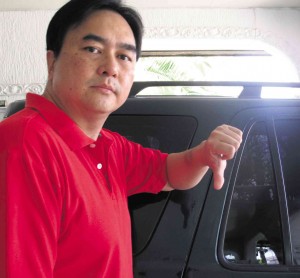Quezon Avenue dealer gets its third complaint
There is no such creature as a perfect car, and there is no such creator as a perfect car manufacturer. Even if it’s from Japan.
This Quezon Avenue dealership of a popular Japanese brand has now been the subject of three complaints.
William Herrera, Red Rock Travel vice president for operations, owns a 1999 Japanese-branded compact SUV. Last week, he needed to replace his SUV’s rear quarter glass, so he called up the Quezon Avenue dealership to ask about the cost of replacing the glass.
“They said they didn’t have the part, and it would take them a few weeks to order. So I asked them, ‘If I bought the part from Banawe, how much would they charge me for installation?’ The person at the other end replied, ‘It would be P1600, plus 25 percent of the price of the glass you bought elsewhere.’ He then asked me to provide them an official receipt from where I would purchase the part.”
Herrera then called the Caloocan dealership. “The guy charged P1,200 to install the glass, and no surcharge even if I bought the part from Banawe.”
Hey, Quezon Avenue dealership, what’s so special about your place you’d have to charge significantly more, plus surcharge, on the same service?
This dealership is already “trending,” as far as sorry booboos go. The first incident involved two cars of music director Rodel F. Colmenar, who related to R&D on Feb. 19 his troubles with the Quezon Avenue dealership. The second was published in R&D on March 6, this time involving businesswoman Bet Enano and her 6-year-old car.
Across the brand
In a motoring society where the word “recall” is avoided like the plague, the recent initiatives of top-ranked carmakers (Mitsubishi, Honda, Nissan and Toyota) is a welcome, albeit surprising, development. Honda, of course, has been the local trailblazer, having announced voluntary recalls a number of times before. Honda Cars Philippines (HCPI) says voluntary recalls have not affected sales and customers’ brand loyalty.
Last week, Toyota, Honda, Nissan and Mazda globally recalled up to 3.4 million of its cars over a possible faulty airbag. In the Philippines, where car manufacturers are not compelled by law to publicly announce a local recall, Toyota, Nissan and Mazda may have been forced to do so because the rest of the world already did.
On April 11, HCPI announced a voluntary recall of some 9,743 units of the Honda Civic and CR-V models 2001 and 2002 for a possible faulty inflation device of the front passenger airbag. Globally, Honda recalled over 1.1 million of its vehicles.
Defective airbags
Although there has been no actual documented case of abnormal deployment of passenger airbags, findings of vehicle assembly procedures have shown that during the manufacturing process, the automatic rejection system failed to detect defective airbag inflators with low-density propellants. Subsequently, these defective inflation devices were installed in these vehicles. As a result, upon airbag deployment, the pressure increases excessively and might cause the inflator case to rupture.
On April 18, Toyota Motor Philippines was the town crier, announcing that about 3,500 units of its Corolla Altis in the Philippines assembled between 2001 and 2003 might be affected by the problematic airbags.
“Globally, there have been no customer complaints regarding this condition,” Toyota Motor Philippines vice president Rommel Gutierrez stated. “However, in line with our commitment to the safety of our customers, Toyota would like to commence a special service campaign of the affected units.” He added the affected parts would be evaluated and, if a defect has been found, subject to replacement at no cost to the vehicle owner. “Right now, we encourage customers whose vehicles (Corolla Altis) fall under the affected production dates to visit any of our authorized Toyota dealerships nationwide. You may call Toyota’s Customer Assistance Center at 02-8192912.”
Nissan Motor Philippines’ Karla Tecson clarified that the units being recalled by the Nissan global office are not currently available in the Philippines. Berjaya Motor Philippines (the Mazda distributor) also issued a statement that none of its vehicles in the country are affected by the global recall.
R&D reported on April 10 that the voluntary safety recall announcement for 1,420 units of the Mitsubishi Mirage for a possible antilock braking system problem came two days before the April 4 Car Awards Group Inc. announcement that the subcompact won the 2012-2013 Car of the Year in the Philippines.
‘Took the initiative’
Mitsubishi Motors Philippines Corp. marketing services vice president Froilan Dytianquin said: “though there is still no implementing rules and regulations regarding automotive recall in the Philippines, MMPC took the initiative to report the recall to Secretary Gregory Domingo of the Department of Trade and Industry, (it) being the government lead agency on consumer protection.”
Wherever the recall emanates from, keep your eyes and ears open for any motoring developments happening within the country or abroad. You never know when, or what, the next recall will be.
For your car ownership experience—pleasant or otherwise—email the author at tsalazar@inquirer.com.ph. All cases are personally verified by the author. To avoid isolated, prejudiced or fabricated cases, this section will not mention a brand, dealership or a particular vehicle model unless it receives at least 15 similar complaints.

